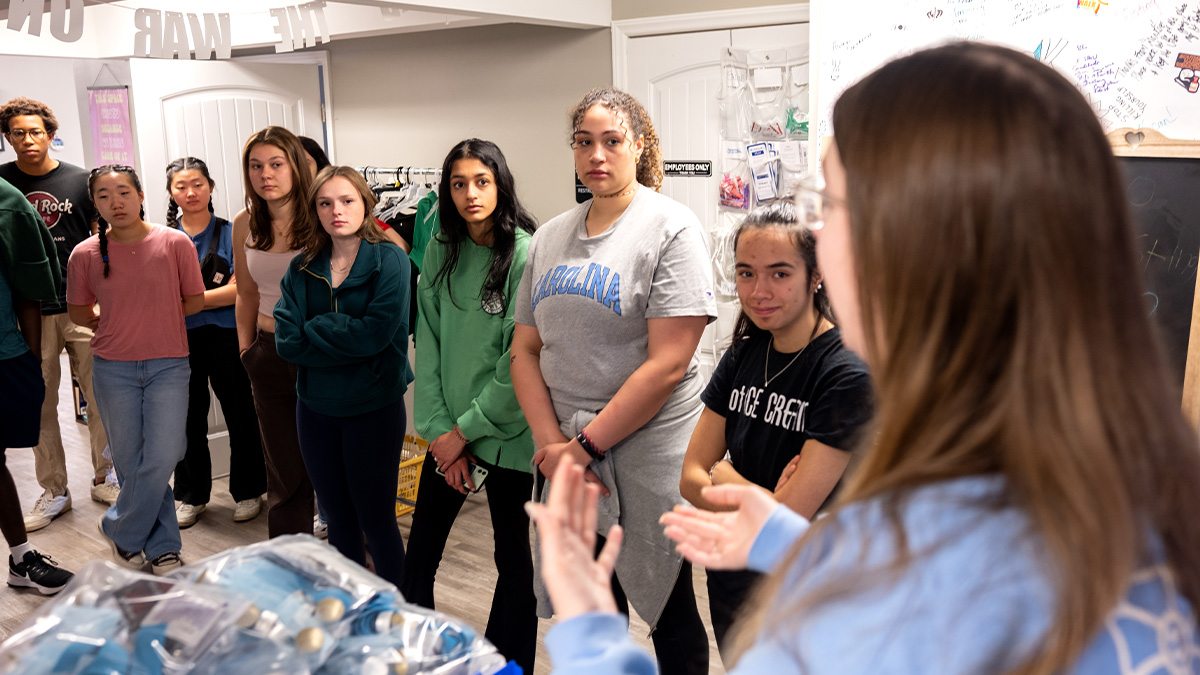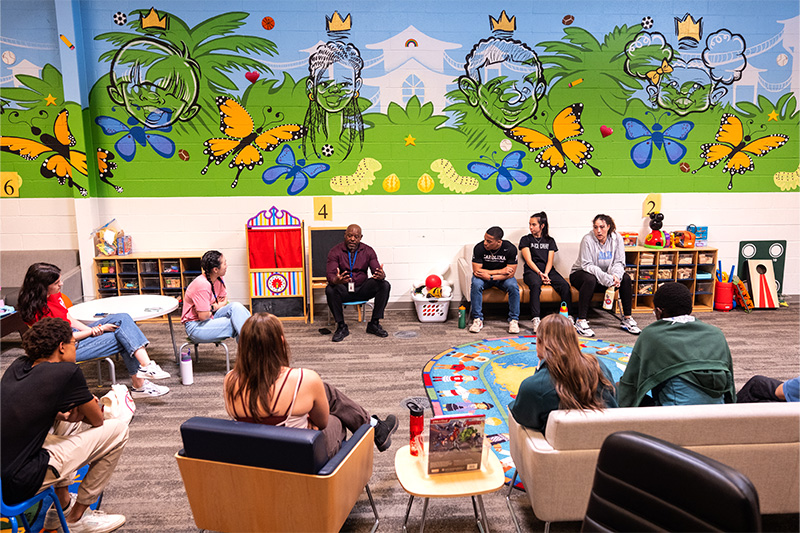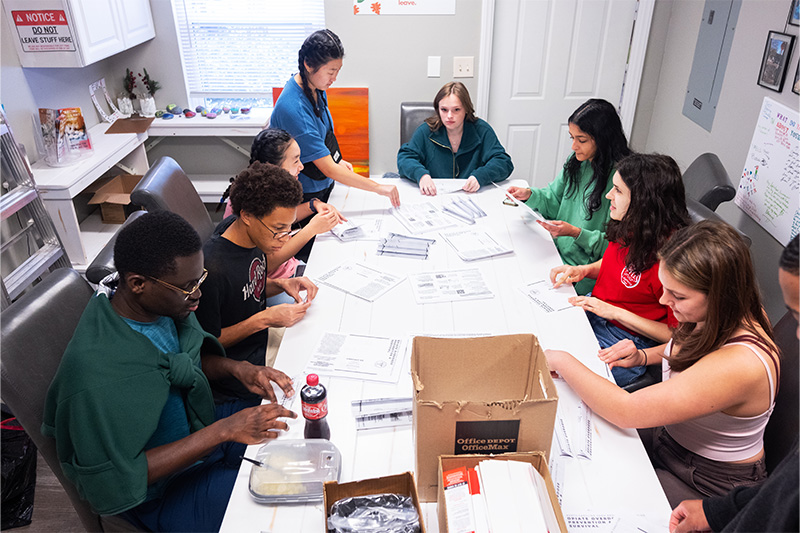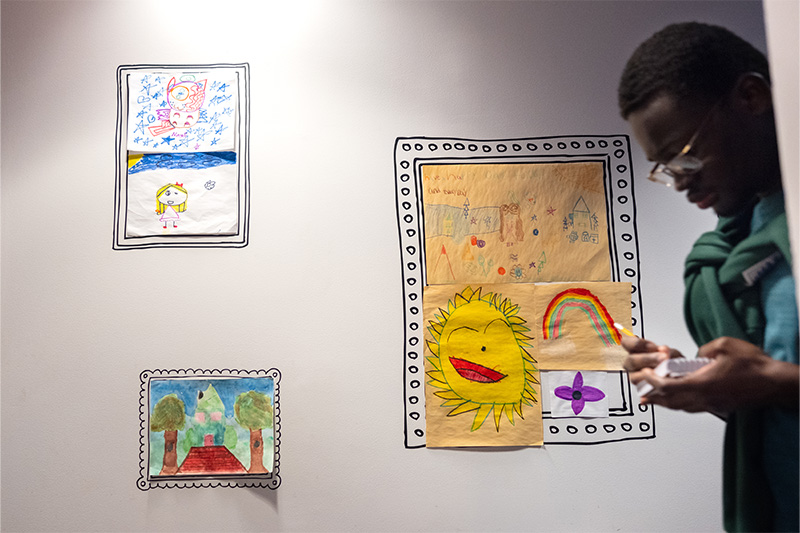Students use spring break to serve, explore careers
Tar Heels volunteered and learned about violence prevention on an APPLES service-learning trip to Charlotte.

For Carolina junior Malachi Jowers, APPLES Alternative Spring Break trips have become the norm.
For the second year in a row — this time as a trip leader — Jowers spent his spring break in Charlotte to volunteer and learn about a range of social issues during this program of the Carolina Center for Public Service.
The course includes the trip and a two-credit-hour course focused on service learning and specific themes. Violence prevention was the theme of the Charlotte trip, while students focused on issues facing rural communities spent their break in Robeson County.
“After going on this trip and being in this class last year, there would be many conversations where I could just talk to people and let them know here’s what I learned — common misconceptions about homelessness, domestic violence, abuse and all those things I could try to educate people about,” Jowers said while packaging opioid overdose rescue kits at Queen City Harm Reduction on a Thursday morning.
Jowers, fellow break leader Emme Jordan and nine other students packed a full itinerary into six days. Spending their nights at First United Methodist Church, they hit the road each day in a pair of rental vans, making a dozen service-learning stops in the community.
They learned about public-safety plans run by the City of Charlotte, met with professionals whose vocations involve helping survivors of sexual assault and spent time with children whose lives have been impacted by domestic violence.
They heard about how harm-reduction efforts can cut down on drug overdose deaths, toured a nonprofit devoted to bringing justice to child abuse victims and helped feed others at a soup kitchen.
“These are the types of stories you don’t normally see. Those are the types of people that you don’t normally see,” said Twumasi Duah-Mensah. A senior, he said he wanted to participate in the trip because he was curious about “alternatives to looking at violence that we don’t normally see highlighted in our media.”
 Timothy Bradley, a Mecklenburg County employee, spoke to students at the Valerie Woodard Resource Center. Bradley oversees a program that holds supervised visits between children and parents in families impacted by domestic violence. (Jon Gardiner/UNC-Chapel Hill)
Timothy Bradley, a Mecklenburg County employee, spoke to students at the Valerie Woodard Resource Center. Bradley oversees a program that holds supervised visits between children and parents in families impacted by domestic violence. (Jon Gardiner/UNC-Chapel Hill)
Koen Ifill, a sophomore studying political science and English, learned that there’s no single procedure for preventing violence. “There’s no single category for it, and they all tie into each other,” he said. “It’s really interesting to be able to watch how it folds into each other and interconnects.”
Ifill is from Harrisburg, North Carolina, about 30 minutes outside Charlotte, and interested in law. The chance to learn from professionals about an issue close to home appealed to him.
 Students packaged opioid overdose rescue kits for distribution at Queen City Harm Reduction, an organization that aims to reduce overdose fatalities and prevent the spread of infectious disease. (Jon Gardiner/UNC-Chapel Hill)
Students packaged opioid overdose rescue kits for distribution at Queen City Harm Reduction, an organization that aims to reduce overdose fatalities and prevent the spread of infectious disease. (Jon Gardiner/UNC-Chapel Hill)
Sara Williams, a junior from Durham studying political science, also saw a link between the trip’s subject matter and a potential career.
“I want to work for a nonprofit, very similar to some of the ones that we’ve been to,” Williams said. “I want to get more into that community to make my life more about service.”
On the trip, students met people doing exactly that, people like Alexa Crossley and the rest of the team at Queen City Harm Reduction, Mary Kathryn Elkins at Pat’s Place and Timothy Bradley at the Valerie Woodard Community Resource Center.
Their time with the organizations and community leaders was limited, but the students realize the work they do is continuous … and growing.
“The big thing I’ve enjoyed is seeing the growth of the organizations between last year and this year,” Jowers said, pointing to one of the organizations visited, Hope for Justice, which works against human trafficking. “Last year, they didn’t even have an office. Then yesterday we went there, and they’re in this super nice high-rise tower … just seeing the growth that they’ve made and how many more people they’ve helped in the past year.”
 Twumasi Duah-Mensah takes notes as he tours Pat’s Place Child Advocacy Center. The center is a nonprofit organization that coordinates the investigation, proseuction and treatment of the most severe cases of child abuse in Mecklenburg County. (Jon Gardiner/UNC-Chapel Hill)
Twumasi Duah-Mensah takes notes as he tours Pat’s Place Child Advocacy Center. The center is a nonprofit organization that coordinates the investigation, proseuction and treatment of the most severe cases of child abuse in Mecklenburg County. (Jon Gardiner/UNC-Chapel Hill)







